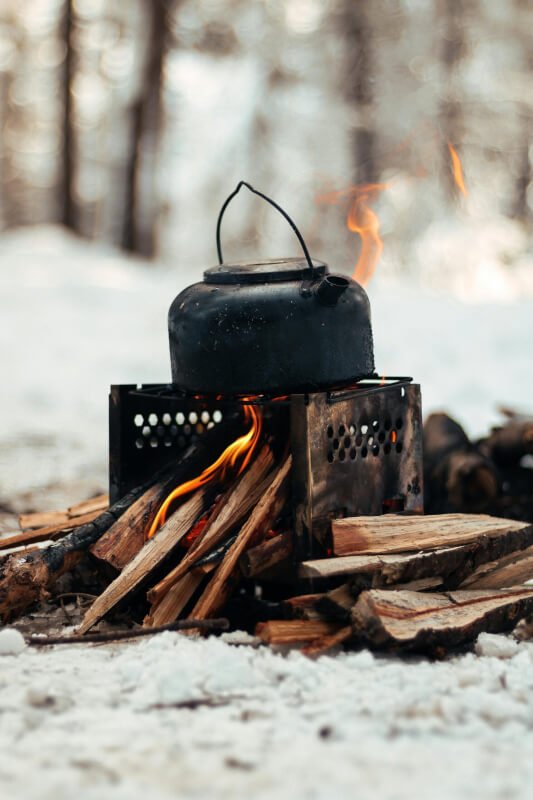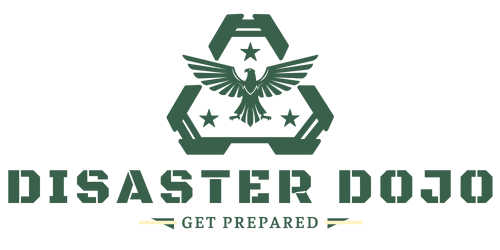In today’s uncertain times, it has become increasingly important for Americans to prioritize their preparedness and ensure the strength and safety of their families. In this article, we explore the concept of Survivalist Family and how it is equipping individuals with the skills, knowledge, and resources necessary to face any unexpected challenges that may arise. Discover the strategies and practices that can empower you to become a prepared American, contributing to the resilience and strength of our great nation.

The Importance of Being Prepared
In today’s unpredictable world, it is crucial to prioritize individual and family safety. Being prepared not only ensures your well-being but also contributes to national resilience as a whole. By building a survivalist mindset and embracing self-reliance, you can face potential risks and threats head-on, develop essential survival skills, and create a well-stocked home that can withstand any crisis. Additionally, understanding the significance of home security, communication in times of crisis, firearm ownership, sustainable survival skills, physical fitness, and preparing for natural disasters and economic instability are all key aspects of being truly prepared.
Building a Survivalist Mindset
Recognizing Potential Risks and Threats
To become truly prepared, it is essential to recognize and assess potential risks and threats that could impact your life. This includes understanding the types of emergencies or disasters that are prevalent in your area, such as natural disasters like hurricanes, earthquakes, tornadoes, floods, or wildfires. By familiarizing yourself with potential risks, you can take the necessary steps to mitigate and prepare for them.
Developing Essential Survival Skills
Survival skills are indispensable in times of crisis. From basic first aid training to self-defense techniques, acquiring these skills can significantly increase your chances of surviving and protecting your loved ones. Learning how to purify water, start a fire, navigate using a compass, and administer emergency medical care are just a few vital skills to develop.
Embracing Self-Reliance
Self-reliance is a core principle of the survivalist mindset. By becoming independent and capable of meeting your basic needs, you can thrive in any situation. Embracing self-reliance involves learning how to grow your own food, adequately prepare and store it, and even forage or hunt for additional sustenance. Alongside food self-sufficiency, being able to generate alternative power sources and handle basic repairs can enhance your self-reliance.

Creating a Well-Stocked Home
Food and Water Storage
One of the fundamental aspects of being prepared is having an ample supply of food and water. It is recommended to have at least a two-week supply of non-perishable food and a gallon of water per person per day. Canned goods, dried foods, and freeze-dried meals are excellent options for long-term storage. Additionally, consider investing in water purification methods such as filters or chlorine tablets to ensure a clean water supply.
Emergency Medical Supplies and First Aid
In times of crisis, having access to emergency medical supplies and knowing how to administer basic first aid can save lives. Stock your home with a well-equipped first aid kit that includes essentials like bandages, antiseptic solution, pain relievers, and any necessary prescription medications. It is also advisable to acquire knowledge in basic first aid techniques and CPR.
Alternative Power Sources
During a crisis, electricity may not be readily available. Having alternative power sources is crucial to keep your home running smoothly. Consider investing in solar panels, generators, or portable power banks to ensure you have access to electricity, especially for medical equipment, communication devices, and refrigeration.
Protecting the Fortress: Home Security
Fortifying the Home
Fortifying your home is a vital step in ensuring the safety and security of your family. This involves reinforcing entry points such as doors, windows, and garages to deter potential intruders. Installing sturdy locks, shatterproof glass, and security film can help make your home less vulnerable to break-ins.
Establishing Security Measures
Beyond physical fortification, establishing security measures such as burglar alarms, surveillance cameras, and motion sensor lighting can further enhance the safety of your home. Additionally, consider forming a neighborhood watch program and exchanging contact information with trusted neighbors to keep an eye out for any unusual activities in your community.
Creating Emergency Plans
Having well-defined emergency plans is essential to mitigate chaos and keep everyone safe during a crisis. Develop evacuation plans for different scenarios, create a designated safe room within your home, and establish procedures for communication and regrouping in case of separation. Practice these plans regularly with your family to ensure everyone is prepared and aware of their roles during emergencies.

Communication in Times of Crisis
Establishing Communication Networks
Communication is paramount during a crisis when traditional channels may be disrupted. Establishing alternative communication networks is crucial for staying connected with your family and receiving important updates. Invest in hand-crank or solar-powered emergency radios and consider becoming a licensed ham operator to access a broader range of communication options.
Emergency Radios and Ham Operators
Emergency radios are invaluable in times of crisis. These radios can receive weather updates, emergency broadcasts, and even serve as a means of communication with emergency services. Becoming a licensed ham operator allows you to use amateur radio bands, providing reliable long-distance communication when other methods fail.
Developing Signal Methods
In addition to relying on technology, it is crucial to develop alternate means of signaling, especially in situations where communication devices may not be functional. Learning Morse code, creating signal flags, or using flashlight signals can all be effective methods to convey messages and communicate with others in times of crisis.
The Role of Firearm Ownership
Firearm Safety and Training
If you choose to own firearms for self-defense or hunting purposes, it is essential to prioritize firearm safety and receive proper training. Familiarize yourself with local laws and regulations, and enroll in firearms safety courses to gain the necessary knowledge and skills to responsibly handle and store firearms.
Choosing the Right Firearm
Selecting the right firearm for your needs is a crucial decision. Consider factors such as intended use, ergonomics, ammunition availability, and your personal comfort in handling different types of firearms. Consult with experts or experienced gun owners to ensure you make an informed choice.
Securing Firearms and Ammunition
Properly securing firearms and ammunition is essential to prevent accidents and unauthorized access. Invest in gun safes or lockable cabinets to store firearms and ammunition separately. Furthermore, ensure that your family members are educated about firearm safety and understand the importance of responsible gun ownership.

Survival Skills for Long-Term Sustainability
Gardening and Sustainable Agriculture
Developing skills in gardening and sustainable agriculture is vital for long-term survival. Familiarize yourself with local growing conditions, crop rotation techniques, and composting to ensure a successful harvest. By cultivating your own fruits, vegetables, and herbs, you can provide a sustainable source of food for your family.
Hunting, Fishing, and Foraging
Learning how to hunt, fish, and forage for food expands your self-reliance and enhances your chances of survival in a crisis. Acquiring knowledge about local wildlife, fishing techniques, and edible plants in your region can provide additional sources of sustenance, especially when other food supplies may be scarce.
Preserving Food for the Long Haul
Preserving food through methods such as canning, dehydrating, and fermentation is essential to extend its shelf life. Acquiring the necessary equipment and learning proper preservation techniques allows you to store surplus food from your garden or any hunting and foraging activities. This ensures a steady food supply even when fresh foods are unavailable.
The Role of Physical Fitness
Building Strength and Endurance
Maintaining good physical fitness is crucial for surviving and thriving during a crisis. Regular exercise, including both cardiovascular and strength training, builds endurance and strength, enabling you to handle physically demanding tasks. Engaging in activities like hiking, swimming, or weightlifting not only improves your physical capabilities but also boosts mental resilience.
Learning Self-Defense Techniques
Knowing self-defense techniques can help you protect yourself and your loved ones in dangerous situations. Consider taking self-defense classes to learn practical skills like basic strikes, locks, and defensive maneuvers. These skills can provide you with the confidence and ability to keep yourself safe in unforeseen circumstances.
Maintaining Mental Resilience
In addition to physical fitness, it is equally important to prioritize mental resilience. Engaging in activities that reduce stress, such as meditation, yoga, or journaling, can help maintain mental well-being during challenging times. Building a support system and regularly connecting with loved ones can provide emotional stability and foster a strong sense of community.

Preparing for Natural Disasters
Hurricanes, Earthquakes, and Tornadoes
Natural disasters such as hurricanes, earthquakes, and tornadoes can strike with little warning, causing widespread damage. Understanding the specific risks associated with each type of disaster is crucial. Identify the safest areas within your home to take shelter, establish emergency evacuation routes, and have essential supplies readily available to survive these events.
Floods and Wildfires
Floods and wildfires can quickly devastate homes and communities, requiring swift action to ensure safety. Prioritize flood mitigation by understanding flood zones, investing in flood insurance, and creating barriers to prevent water infiltration. In wildfire-prone areas, clearing vegetation around your home, having fire extinguishers on hand, and monitoring local fire advisories is essential.
Preparing for Extreme Weather Events
Extreme weather events, such as heatwaves, blizzards, or severe storms, can pose significant risks to your well-being. Ensure your home is equipped with proper insulation and ventilation for extreme temperatures. Have a backup plan for heating or cooling needs, and stock up on emergency supplies such as blankets, warm clothing, or cooling packs to manage weather-related emergencies.
Preparing for Economic Instability
Financial Preparedness and Emergency Funds
Preparing for economic instability involves having a solid financial plan and establishing emergency funds. Aim to have enough savings to cover at least three to six months’ worth of expenses. Prioritize reducing debt, diversifying income sources, and living within your means to build financial resilience.
Investing in Tangible Assets
Investing in tangible assets, such as gold, silver, or real estate, can provide a level of stability during economic downturns. These assets can retain their value even when traditional investments, such as stocks or bonds, may experience significant fluctuations. Consult with financial advisors or experts to make informed decisions based on your individual circumstances.
Building a Sustainable Income
Building a sustainable income involves diversifying your income streams and exploring opportunities for self-employment or entrepreneurship. Acquiring skills in areas like carpentry, cooking, or crafts can open up possibilities for generating income even during times of economic instability. Creating a side business or exploring gig economy opportunities can provide an additional safety net.
In conclusion, being prepared is not just about individual survival—it contributes to the strength and resilience of our nation as a whole. By building a survivalist mindset, creating a well-stocked home, prioritizing home security and communication, understanding the role of firearm ownership, acquiring essential survival skills, maintaining physical fitness, and preparing for natural disasters and economic instability, you can ensure the safety and well-being of yourself and your family. Let us stand together as prepared Americans, ready to face any challenge and contribute to a strong and resilient America.


